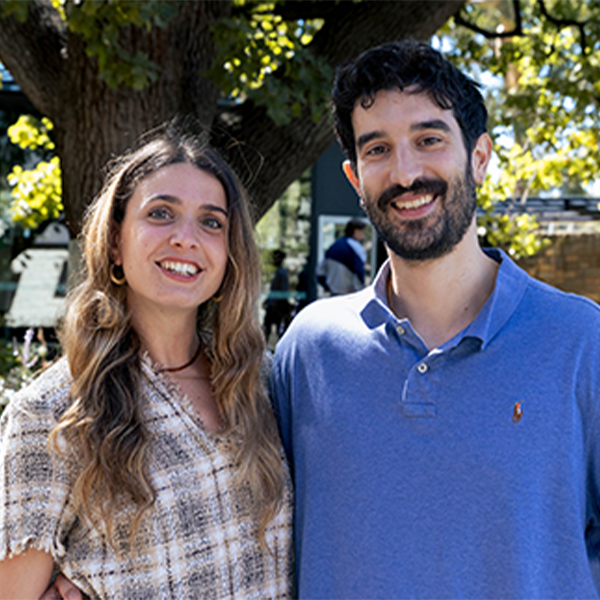


Hindsight is a funny thing.
It brings a faint smile to think that ‘Come on Eileen’, the 1982 hit of British new wave pop band Dexys Midnight Runners, was the catalyst behind one of Trinity College’s most recognisable musical performance groups. (Long before ‘Come on Eileen’ rhymed with COVID-19.)
In 2006, Harrison Wraight (TC 2006) was hanging out in the room of fellow collegian Nick Masters (TC 2006), listening to an a cappella version of Come on Eileen he had recently stumbled upon. ‘We both loved it and decided we could do something like that. But we had absolutely no idea where to start,’ recalls Harrison.
Enter Angus Turner – the man with the posters that fortuitously steered their musical aspirations.
Fresh off the plane from merry ‘ole England where he’d been studying at Oxford, Angus had commenced at Trinity as a resident tutor that year. While enjoying the endless bleakness that epitomises Blighty, Turner had been president of the Oxford’s all-male a cappella group, Out of the Blue – formed in 2000 and taking its lead from the much longer-established American collegiate ‘barbershop’ groups, such as The Harvard Callbacks.
Given Trinity’s established music programs had, since the 1970s, centred around the more classically trained choral tradition of the college choir, Angus felt there was scope for an alternative musical expression, akin to what he’d been involved with at Oxford. Hearing of Harrison and Nick’s interest in signing a cappella style, he promptly started pasting up posters for auditions for an all-male a cappella group.
Preppie Oxford or Harvard lads in shawl-neck cardigans might be prime candidates for a sing-along. But how would such a proposal sit amongst young sports-mad Australian men?
‘I thought in Australia it would be a bit harder because guys don't normally get together and sing-song,’ Angus remembers of the inaugural group's formation in 2006 – founded as a collaboration between him, Harrison and Nick. ‘But they loved it.’
Wanting to recognisably identify themselves with Trinity, the boys took their name from Trinity’s sacred central lawn and called themselves the ‘No Bul Barbershop’ – to play on the name Bulpadock (yes, with just one ‘d’). Soon, the group were performing regularly at various college dinners and events. But their aspirations were already extending well beyond Trinity’s address at Royal Parade. Soon, between mouthfuls of gelati, Carlton’s famed restaurant strip in Melbourne was being enlivened with the guys’ dulcet tones.
‘Once [the group] saw the response from people when we went busking down on Lygon Street, they realised they were on to something quite entertaining,’ Turner remembers.
Proceeds from busking were directed towards the group’s first interstate trip, and in May 2009, the now re-branded ‘Trinity Tiger Tones’ performed at St Mark’s College in Adelaide, along with several schools. Emboldened by their adventures in Adelaide, the newly minted Tiger Tones held a further two successful concerts upon returning to Melbourne.
The following years were marked with numerous highlights. It was a chance encounter with Oxford’s Out of the Blue that laid a course for the Tones’ next bold move. ‘On Britain’s Got Talent there was a group called Out of the Blue,’ explains Yi-Wen Lai-Tremewan (TC 2010), ‘and seeing them perform gave us the initial idea to go on Australia’s Got Talent.’
‘What are you studying in Trinity College,’ asked Irish judge, singer and songwriter Brian McFadden, as the group presented themselves on stage for the first round of auditions in 2012. ‘A range of degrees,’ came the reply, citing science, medicine and commerce. McFadden quipped, ‘So, you’re the singing nerds! I love it!’
It might have been a dig, but the group’s performance blew the judges away. ‘I actually want to join,’ McFadden admitted to fellow judge Dannii Minogue afterwards. The Tiger Tones made their way to the semi-finals, with a strong lead vocal in Nathan van As (TC 2010) delivering a standing ovation from the audience.

With national recognition came more opportunities. In October 2012, the group performed at the BMW Edge auditorium in Federation Square to much acclaim. In a glowing review, Amelia Alder wrote that the developmental growth the Tiger Tones had made over the last few years showed ‘promising signs for the future of university-based contemporary a cappella groups in Australia.’

She was right. As time passed, the Tiger Tones secured more and more external paid performances and the group’s social media popularity increased.
As old members left, as new members joined and as profile was raised, links to the past softened. Although new group members appreciated that they were part of a long-standing Trinity tradition, to many of them, the story of the group’s actual formation was unbeknownst.
Hence, in Perth in late 2015, visiting their fellow vocalists, ‘The Newby Blues’ of St George’s College at the University of Western Australia, the Tones thought they’d made a ‘discovery’. Second-year Tiger Jack Wright (TC 2014) reported back upon his return to Melbourne that: ‘While we were there, we found out about our third brother group, Out of the Blue from Oxford.’ Little did he and his group realise that this ‘brother’ ensemble was in fact the original inspiration behind Trinity’s own a cappella formation.
When the Tiger Tones hit their 10-year anniversary, ‘head barber’, Lloyd Miller (TC 2014) decided to mark the occasion with an international tour, arranging a joint performance with Out of the Blue on their home turf. With the ball rolling, contact with other a cappella groups across the UK and Ireland followed, including Trinity College Dublin’s ‘The Trinitones’ and ‘The Other Guys’ from the University of St Andrews, Scotland.
‘The Trinitones were absolutely amazing!’, says Jack. ‘We contacted Neil Dunne, their head barber, back in early 2016 and we were met with nothing but enthusiasm. From the moment we arrived in Dublin, they welcomed us into their homes and university and had lined up some brilliant activities and experiences for us.’
And so, at 8pm at Dublin’s Bello Bar, on a brisk Friday evening in late November, the two a cappella groups came head-to-head in what was billed as the ‘Clash of the Tones’ concert in Dublin. A packed venue of ‘enthusiastic fans and family members’, as Ireland’s University Times reported, ‘aided in no small part by a lengthy opportunity to avail of the bar before the show began.’
Hospitable as the Irish brethren were, they had a slightly different take on the meeting. ‘What initially began as a friendly competition quickly escalated into something more sinister as the visiting group – Melbourne’s Tiger Tones – upstaged their hosts and stole the hearts of the [Irish] Trinity locals,’ the Trinitones subsequently noted.
The gauntlet had been thrown. A rematch was called. The following September, the Trinitones made their way southwards for round two of the Clash of the Tones at Melbourne’s own Athenaeum Club. The fundraising dinner accompanying the performance, along with other performances by the Trinity group that year, raised an impressive $10,000 for BeyondBlue, supporting mental health.
The friendship between the two Trinity groups continued, with a healthy smattering of competitiveness. Adding insult to injury at a round three battle in Dublin in 2018, the Trinitones retaliated by ‘kidnapping’ Tiger Tone talisman, Ranald Macky (TC 2014) – the baritone with velvety vocals – who relocated to Trinity College, Dublin, to complete the final units of his Bachelor of Commerce degree.

The Tiger Tones remain one of Australia’s premier all-male a cappella ensembles and are fantastic ambassadors for Trinity College around the globe.
(Oh, and if you want to join – Trinity College application details can be found here!)
Watch the Trinity College Tiger Tones on Australia's Got Talent in 2012.
{^youtubevideo|(width)852|(height)529|(rel)True|(autoplay)False|(fs)True|(url)https://www.youtube.com/watch?v=jFFHHgrh5xo^}



